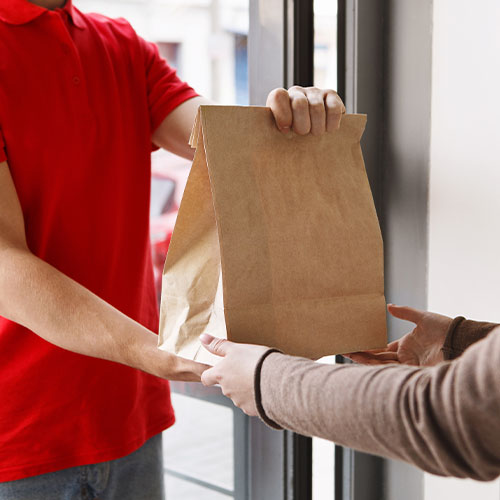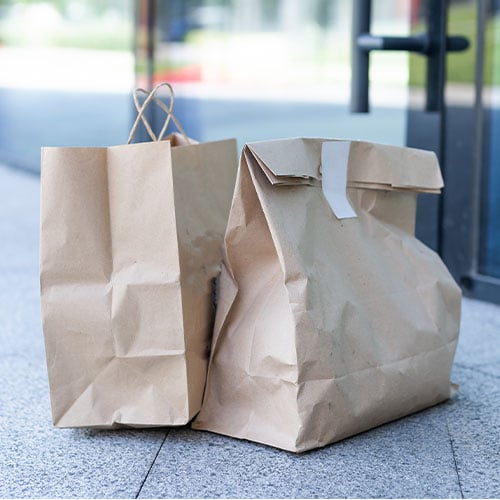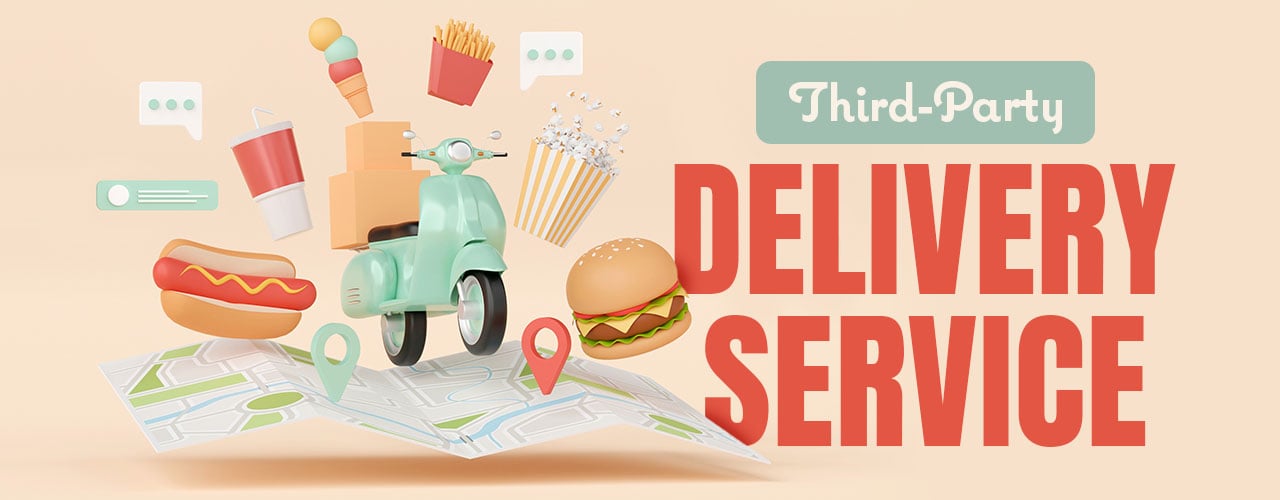Food delivery and takeout services are two of the fastest growing segments of the restaurant industry. In the US, it's reported that 60% of consumers order takeout or delivery at least once a week. A growing reliance on convenience and quick service has created a boom in food delivery and offshoot services like curbside pickup and no-contact delivery. For restaurants affected by the pandemic, delivery service has provided a supplemental revenue stream.
If you're interested in employing a restaurant delivery service, one of the first decisions you'll need to make is whether you should build your own team or use a third party company. Keep reading to learn more about how to choose the right service for you!
Shop All Delivery Supplies
Tips for Food Delivery and Take-Out
If you're ready to add delivery services to your restaurant, follow these steps to get started:
1. Designate a Space for Delivery
By designating a space for your delivery drivers to pick up their orders, you help them to bypass a line of waiting customers and increase their efficiency. This space can also be used as a carry-out area for customers picking up their orders.
If you would like to be even more efficient, create a space for employees to package delivery and take-out orders only. Designate a take-out checkout station for customers who did not pay over the phone or online.
2. Make Updates to Technology
Online ordering platforms make it easy for your guests to view your menu, place their orders, and pay for your services digitally. This eliminates the need to take orders by phone, which can be time-consuming and lead to mistakes in the food order. Mobile ordering apps make it convenient for customers to place orders no matter where they are, whether it's at home, on the go, or at the office. By updating your ordering technology, you can streamline your delivery service and attract new customers.
3. Train Food Delivery Service Staff
If you choose to create your own delivery fleet, take the time to make a training program for your delivery staff. Teach your delivery drivers how to use insulated delivery bags, how to load food and drink orders in their vehicle, and how to pass orders to customers safely.
Hiring a third-party delivery service eliminates the need to train your own drivers, because these companies employ their own experienced delivery drivers. However, your in-house team is still responsible for packaging all orders and getting them ready for pickup. It helps to designate one or two team members just for boxing up take-out orders, especially on a busy night. Train your take-out team to check orders for accuracy, package them for transport, and include any necessary condiments or cutlery. They should know where to place orders when they are ready and make sure the delivery courier is being given the right order.
4. Create a Delivery Menu
Making a separate delivery menu helps simplify preparation and packaging for your staff. Start by choosing from some of your most adored menu items. Avoid foods that might get too soggy or melt after they are placed in sealed carry-out containers. Also ask your staff which meals and sides they think would be good additions for your delivery menu.
5. Stock Delivery Supplies
Be sure to stock up on take-out containers, utensils, napkins, lids, cups, pizza boxes, condiments, and insulated food delivery bags so that your staff never runs out of the items needed to complete an order.
<figure class="article-img article-img--sm article-img--left">
<figcaption style="font-weight: bold;">Insulated Food Delivery Bags from $7.99</figcaption>
</figure>
<figure class="article-img article-img--sm article-img--left">
<figcaption style="font-weight: bold;">Pizza Delivery Bags from $9.07</figcaption>
</figure>
<figure class="article-img article-img--sm article-img--left">
<figcaption style="font-weight: bold;">Deli Containers from $3.39</figcaption>
</figure>
6. Build a Relationship With Food Couriers
If you choose to hire a third-party delivery service, get to know the delivery couriers that serve your location. Working together to get delivery orders out to your customers as quickly as possible is the common goal. This is much easier when your in-house team and third-party couriers are able to connect and successfully transfer orders or information. Designate a team member on every shift as the point-person for interacting with delivery drivers.
Why Should Your Restaurant Offer Delivery Services?
If you're looking to boost your sales, adding delivery service to your restaurant will help you distinguish yourself from the competition - or at least keep up with them. Keep in mind that delivery will only grow your brand if you already have market presence and a loyal customer base. Potential customers can't order from you if they've never heard your name. Once you're on the delivery circuit, you'll be available to customers who may not have tried your food before, which can lead to increased profits.
Before jumping onto the delivery bandwagon, you should ask yourself whether it will work for your business model. Delivery doesn't usually suit fine dining restaurants, for example, and you should also avoid it if your cuisine won't hold up well during delivery. The last thing you want to do is turn your customers off by providing them with sub-par delivery food.
Use Delivery Services to Attract Millennial Consumers
Using in-house or third-party delivery services at your restaurant is also an excellent way to attract more Millennial (or Generation Y) customers. According to the US census, the Baby Boomer population has officially been surpassed by the size of the Millennial generation (people now aged between 25 and 39), making them an extremely important demographic. Members of Generation Y value convenience and instant accessibility over cost, so they're a goldmine for restaurants with delivery services.
One important thing to remember about your Generation Y customers is that they're probably not loyal to any one third-party delivery service. So, you may want to look into using more than one delivery service. Accordingly, you shouldn't sign any contracts that have exclusivity clauses. If possible, try to partner with delivery platforms that provide customers with the ability to earn rewards and points, as this is also something Millennials are actively seeking as they make their ordering decisions.
Utilize Delivery and Take-Out During Pandemic Restrictions
The coronavirus pandemic has forced many individuals to shelter in place, making food delivery service extremely important for those who can't leave home to buy groceries. It's possible to diversify your restaurant's revenue stream by adding a delivery option to your services. Notify customers through social media and your website that you will still be operating and providing delivery, drive through, and take-out instead of servicing dine-in customers to adhere to government standards.
What Are the Benefits of Building an In-House Delivery Team?
Wondering how to start a restaurant delivery service at your establishment? If you have the time and money to train and build an in-house delivery team, you should consider this option before going straight to a third-party service. Two examples of well-known companies that use this delivery model are Starbucks and Panera Bread.
One of the main benefits of creating a delivery service for your restaurant is that it eliminates the chance that consumers may think of the delivery service before your business. You'll also increase brand loyalty and visibility and ensure you won't be overshadowed by the big third-party services that your competitors may be employing.
According to recent studies, 76% of consumers revealed that they prefer to order directly from the restaurant of their choice, rather than through third-party services. On average, maintaining your own delivery team is also 46%-50% cheaper than employing the services of third parties. This will also boost your revenue, since you're collecting 100% of the profits from each meal served.
Finally, making the choice to build your own delivery team provides your business with complete control over the consumer's dining experience, from ordering and meal preparation to delivery and payment. Your trusted employees will also be the ones interfacing with customers, rather than the unknown staff of third-party companies.
What Are the Potential Disadvantages of Building an In-House Delivery Team?
While there are a number of benefits to creating and maintaining your own delivery team, doing so isn't practical or feasible for every restaurant. If you run a small business, chances are you don't want to spend the extra money on in-house delivery staff. Similarly, if you shop around for services, you're likely to find a third-party company with a low commission that will help your small company's bottom line and raise your profit margins.
What Is Third-Party Food Delivery?
Simply put, third-party food delivery companies partner with restaurants to provide food to hungry customers. This contrasts with in-house delivery services where businesses hire their own delivery drivers or train existing employees to deliver food.
Third-Party Delivery Companies
Part of what makes these options so appealing is their food delivery apps. While there a wide selection of third-party services available, a handful of the most popular options are below:
Caviar, which allows users to browse photos of restaurant menus and track their order in transit via real-time GPS.
DoorDash, which offers delivery tracking, easy reordering, the ability to schedule deliveries in advance, convenient online payment, and no order minimums.
Grubhub, which allows users to read menus, order, and pay via online platforms like Apple Pay and PayPal.
Postmates, a delivery service where the customer's order is called in to restaurants by Postmates employees and then picked up and delivered. Postmates calls itself "The Uber for Stuff" and provides real-time tracking and deliveries from virtually every restaurant to almost any setting.
Uber Eats, an online ordering and delivery platform where users can view menus, have their location detected by GPS, order food, and pay online.
Yelp Eat24, a service that faxes each customer's order to the restaurant of your choice within seconds. The app verifies that the establishment has receives the order and then picks up and delivers the food to you.
Chains Using Third-Party Delivery Services
Third-party delivery services are particularly popular with single-location businesses, but the following chains are also starting to use these delivery programs in some regions of the country:
7-Eleven via DoorDash
Auntie Anne's / Carvel / Cinnabon via Postmates
Chipotle via Postmates
Dunkin' Donuts via DoorDash
McDonald's via Postmates
Moe's Southwest Grill via Postmates
Starbucks via Postmates
Taco Bell via DoorDash
What Are the Benefits of Partnering with Third-Party Delivery Companies?
There are a number of benefits associated with partnering with a third-party delivery service. In addition to increasing your brand's visibility and boosting sales, these companies allow you to minimize losing customers due to busy signals on your phones or long wait times. Hiring a third-party service is also a smart choice for businesses with managers and owners who don't want the responsibility of hiring and training an in-house delivery team.
Your customers will also appreciate that third-party services allow them to place repeat orders and may even have apps that save their credit card information for effortless ordering in the future. Many of these companies are also in competition with each other in order to attract more businesses, which can also drive down service charges and commissions.
What Are the Potential Disadvantages of Partnering with Third-Party Delivery Companies?
While hiring a third-party delivery service is intended to increase your business's profits, there are important liability issues to consider. In addition to third-party drivers becoming involved in automobile accidents, there's also a chance that customers could develop foodbourne illnesses from meals that have sat in a car for too long. Because your restaurant isn't directly responsible for these issues, you need to be prepared to protect your business.
To minimize your risk, you'll want to draw up written partnership agreements with all of the delivery services you work with. Include the following provisions in these documents:
Require that delivery companies comply with industry standards for safe food handling (including temperature maintenance). Similarly, choose services that use GPS tracking to fully establish responsibility in case of foodbourne illnesses.
Require delivery drivers to provide proof of insurance and clear vehicle ownership.
Include specific language that shifts full responsibility for any issues in transit onto the third-party service.
Require the delivery company to have insurance coverage that names the specific businesses they're partnered with.
Include specific disclaimer language in delivery menus, paper ads, and on your website to anticipate potential customer concerns and complaints.
How Are Delivery Services Impacting the Foodservice Industry?
Wondering why online restaurant delivery service has become so popular among consumers? To start, these services are incredibly convenient because they allow consumers to order from home or work without having to travel. These services encourage people to browse menus of restaurants they hadn't heard of previously and can also lead to them trying new businesses and cuisines.
According to several studies, as third-party delivery continues to grow, it will have a positive impact on the sales and profits of businesses that adopt it. On the other hand, many experts believe refusing to incorporate delivery will negatively affect foodservice businesses. Dining is a $863 billion-plus industry in the United States, so delivery is sure to have a profound and lasting impact upon thousands of establishments.
Lastly, you should make sure your business isn't inadvertently engaging with unauthorized third-party delivery services without your knowledge. Because companies like Postmates call in or place orders online for customers and then pick them up (cutting the consumer entirely out of the ordering process), you may not even know your restaurant is interfacing with a delivery service. This doesn't mean you shouldn't use Postmates, but rather reinforces that you must have contracts and partnership agreements drawn up before utilizing any third-party service.
From family restaurants and coffee shops to convenience stores and markets, more and more establishments are turning to delivery. If you decide to incorporate a food delivery service into your business, the most important decision you'll have to make is whether to use a third-party service or build your own team in house. No matter what you choose, skillfully utilizing delivery can help build your brand visibility while simultaneously boosting your revenue.






